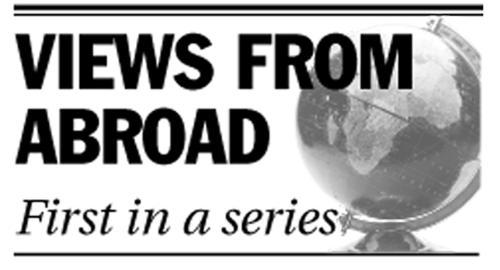
News
Summers Will Not Finish Semester of Teaching as Harvard Investigates Epstein Ties

News
Harvard College Students Report Favoring Divestment from Israel in HUA Survey

News
‘He Should Resign’: Harvard Undergrads Take Hard Line Against Summers Over Epstein Scandal

News
Harvard To Launch New Investigation Into Epstein’s Ties to Summers, Other University Affiliates

News
Harvard Students To Vote on Divestment From Israel in Inaugural HUA Election Survey
Letter to America
Views From Abroad

As summer turns to autumn, a sense of nostalgia gnaws away at the soul. Autumn, late evening, old age—they are all times for quiet reflection, looking back on what was, and on what might have been. Times, too, for introspection, before both body and mind are atrophied by mid-winter chills.
In the Old Testament, time was not viewed as it is today, in quantitative terms, but judged according to its quality. Thus, in Ecclesiastes, there were “good” times, and “bad” times, times to live, and times to die. A more recent perspective of Dickens described revolutionary Europe during the “best of times” and the “worst of times.” How, I often wonder, would such minds view our contemporary world, with its great uncertainties and mercurial temper? How, in particular, would the present United States appear to those for whom the immediacy of the modern media, with all of its faults, and the pressures of gossip in the global village, were unknown?
In the aftermath of last Sept. 11, such questions are particularly acute. In our age, the quality of our times is not always commented upon. Yet we can all accept that these are, indeed, dangerous times. For many, especially in the United States, they are sad times, but they are also sad for the families grieving for the innocent collateral damage in the war against the Taliban, in Afghanistan. These times are also angry times—for those subject to terrorist attack, whether in New York, Jerusalem or Jenin. Angry times, too, for the Arab street. They are worrying times for those whose intellectual responsibility is to think through the nature of the contemporary world, to the causes and effects of terrorism and its cousin, instability.
In doing so—and you and your peers should lead the way both in the States, and, by extension, the world—it is necessary to consider why, in this shrinking global village, do we feel less secure almost daily, and why there appears to be less understanding between people and cultures than was the case in more propitious historical times. What is it that gives rise to such misunderstandings of each other—and, often, such hatred—that terrorism can have currency with so many people?
We must also ask why it is that political leaders are allowed to trade in this same currency, aided and abetted by the media, albeit in more subtle ways than al Qaeda or Hamas? How is it that an independent voice like Noam Chomsky is denied a platform in his own country, whilst poisonous bile is allowed to demean whole cultures and peoples by default?
Setting aside conspiracy theorists, many on this side of the pond see our current situation as an almost inevitable by-product of a world increasingly polarized into “haves” (the West) and “have-nots” (the Third World). Globalization has both exacerbated this polarization, and educated these latter day sans culottes of the Third World into an increasingly hostile posture towards the West. For many, that means principally the United States. In extremis, that hostility can be transmogrified into proactive terrorism.
As I write, great debates are raging here in the United Kingdom about war on Iraq. Much of the media is willfully distorting factual information in support of British Prime Minister Tony Blair, others are raising profound objections to a knee-jerk military solution to a universally-recognized problem. Only a few are looking at why such tyrants as Iraqi President Saddam Hussein emerge and seem to prosper in the world, and what factors turn villains (from our viewpoint) into heroes (from the viewpoint of many in the developing world).
The British are characteristically phlegmatic about terrorism—we have, after all, lived with it in our own backyard for over 30 years. Nevertheless, there does appear to be a remarkable consensus across public opinion and amongst politicians, that the easy fusion in the minds of the present American administration between terrorism and so-called “rogue” states, is not as simple or as rational as Richard Perle would have us all believe. The vast majority also believe that it is the U.N. that should decide on military action, not President Bush, aided and abetted by Tony Blair.
This is the crux of the different analyses of Europeans and Americans. Most of the former look for a multilateralist approach to these dire challenges, whilst your administration appears set on a unilateral approach with the useful propaganda addition of Tony Blair. I stress Tony Blair as opposed to the United Kingdom, because, currently, he does not have either his party or his people on board. Europeans have not been encouraged by the present American administration’s retreat from the Kyoto agreement, from the Anti-Ballistic Missile Treaty, and from open trade. Indeed, the United States is seen as isolationist as well as unilateralist.
A house divided against itself is one that is in trouble. I see the United States and Europe as one cultural house—we share so much in common. I worry in these turbulent times, that house will not stand, unless there is a willingness to listen and concede—on both sides—in order to overcome the perilous dangers facing us all. Iraq is a huge test of our willingness and ability to work together on equal terms, until we arrive in more benign times.
Yours in hope.
Peter Kilfoyle is a member of British parliament for Liverpool Walton and former Minister of Defense under Tony Blair.
Want to keep up with breaking news? Subscribe to our email newsletter.
